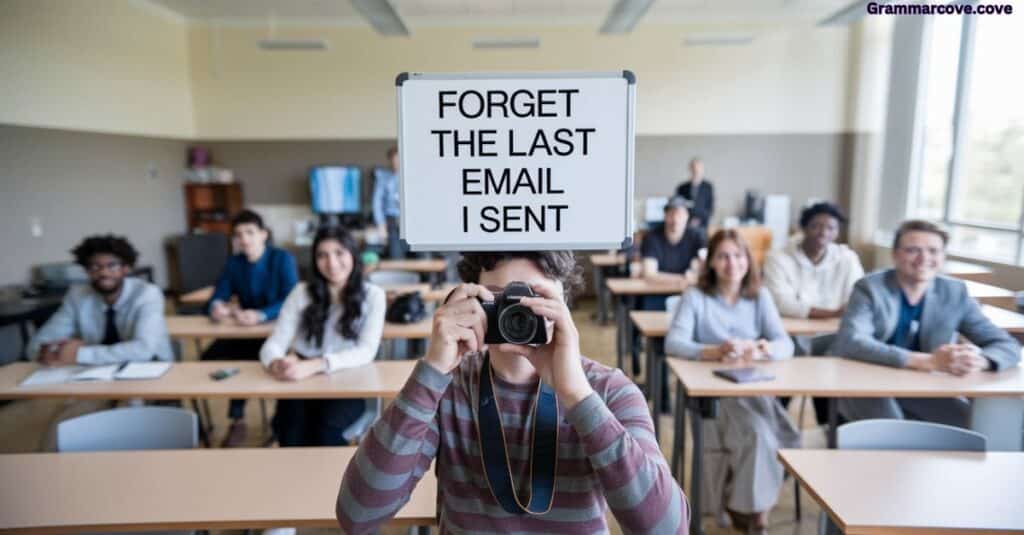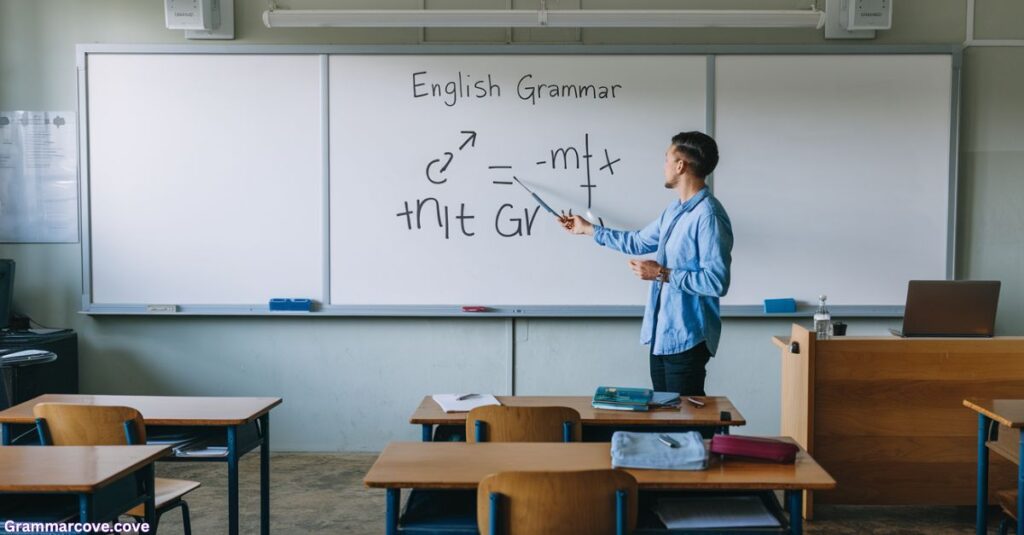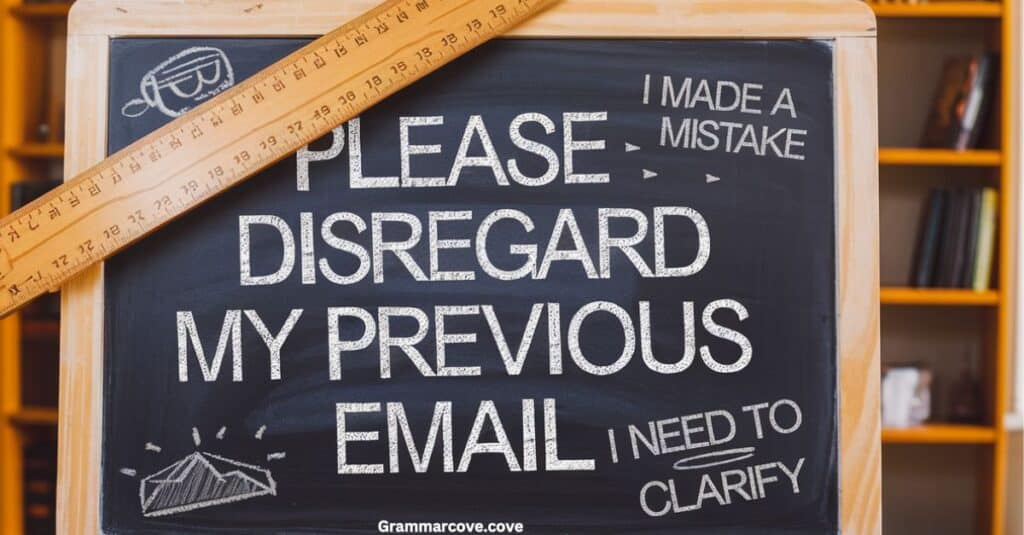
In these cases, knowing how to politely ask someone to disregard your earlier message is key to maintaining professional relationships. Exploring other ways to say “please disregard my previous email” can enhance your communication skills and help convey your message clearly and respectfully. By mastering these alternatives, you can ensure that your intent is understood without causing any confusion.
Below are 20 alternative ways to say “Please disregard my previous email” with specific examples of how you can use them in real-world scenarios.

Ignore Previous Email
This phrase is short, clear, and gets the point across without being too formal. It works well in both professional and casual settings where the recipient doesn’t need too much explanation.
Scenario Example:
Subject: Updated Meeting Agenda
Hi Jessica,
Could you please ignore my previous email? I mistakenly included outdated information about the meeting agenda. Please find the updated agenda attached.
Best regards,
Tom
In this example, Tom keeps the tone polite and simple, ensuring that the recipient knows exactly what to do without feeling burdened.
Disregard Last Message
This alternative adds a touch more formality and works perfectly for professional settings where you need to maintain respect and clarity.
Scenario Example:
Subject: Correction Regarding Payment
Dear Mr. Thompson,
I kindly request that you disregard my last message regarding the payment details. The correct information is attached in this email.
Sincerely,
Amanda
By using “disregard last message,” Amanda maintains a polite, professional tone, making it clear that the previous communication is no longer relevant.

Dismiss Earlier Communication
This phrase is useful in formal contexts where you need to sound respectful but direct. It implies that the earlier message is no longer relevant without sounding overly critical of yourself.
Scenario Example:
Subject: Revised Delivery Schedule
Hello Team,
Please dismiss my earlier communication about the delivery schedule. There was an error, and the correct dates are outlined in the updated document attached.
Thank you,
Brian
By stating “dismiss earlier communication,” Brian ensures that his team knows they should no longer reference the previous message, minimizing confusion.
Set Aside Previous Correspondence
When you want to retract or nullify earlier communication in a formal setting, this phrase works perfectly. It conveys the idea that the prior information is no longer necessary.
Scenario Example:
Subject: Changes in Project Plan
Hi Karen,
Please set aside my previous correspondence regarding the project plan. We’ve made significant changes, and the revised details are attached.
Best regards,
Sophie
Using “set aside previous correspondence” shows that Sophie is respectful of the recipient’s time and that her earlier message is no longer relevant.

Overlook Previous Note
This phrase is polite and formal, suggesting that the previous email was a minor error. It’s a softer alternative that works well in more formal or client-facing communications.
Scenario Example:
Subject: Corrected Instructions – Please Overlook Prior Email
Hi David,
Please kindly overlook my previous note about the onboarding process. I’ve made some adjustments, and the correct instructions are attached.
Best,
Emma
In this context, “overlook” offers a gentler approach, indicating that the earlier message wasn’t a huge issue but still needs to be disregarded.
Kindly Disregard the Last Email
Adding “kindly” to this phrase softens the tone and makes the request feel more polite and considerate. It’s appropriate for situations where you want to show respect to the recipient.
Scenario Example:
Subject: Apologies – Kindly Disregard My Last Email
Dear Michael,
I hope you’re well. Please kindly disregard the last email I sent regarding the meeting time. I’ll send a corrected version shortly.
Thank you,
Sarah
This shows that Sarah is being thoughtful and considerate of Michael’s time, ensuring that her mistake is handled politely.
Please Disregard the Previous Communication
This phrase works in formal or semi-formal settings. It’s appropriate for correcting earlier messages to colleagues, supervisors, or external partners.
Scenario Example:
Subject: Updated Client Proposal
Dear Mr. Patel,
Please disregard the previous communication regarding the client proposal. I’ve identified some discrepancies in the pricing and have attached the revised version for your review.
Warm regards,
Claire
By using “disregard the previous communication,” Claire ensures her message remains professional, clearly explaining that the original details should no longer be considered.

I Apologize for the Earlier Email
Sometimes, a direct apology can help soften the impact of an error. This approach is ideal when you feel it’s necessary to acknowledge the mistake and take responsibility.
Scenario Example:
Subject: Apologies for Earlier Miscommunication
Hi John,
I sincerely apologize for the earlier email. Please disregard the information provided, and instead, refer to the attached document which includes the correct details.
Thank you for your understanding,
Kelly
This version allows Kelly to take responsibility for her mistake while politely requesting that John disregard the original message.
Please Ignore My Earlier Message
This version is casual but still appropriate for many professional settings. It’s a good option when you’re communicating with colleagues or people you have a good working relationship with.
Scenario Example:
Subject: Updated Figures – Please Ignore Earlier Email
Hi All,
Could you please ignore my earlier message? I realized the numbers were outdated, and the correct data is attached to this email.
Best regards,
Jake
Here, Jake keeps things light but professional, allowing his team to quickly understand that they should refer to the updated information.

Forget the Last Email I Sent
This is a casual way to ask someone to disregard an email. It works well for informal communications with colleagues or in friendly workplace settings.
Scenario Example:
Subject: Disregard Prior Email – Correct Version Attached
Hey Susan,
Could you forget the last email I sent? I’ve attached the correct version of the report here. Sorry for the confusion!
Thanks,
Matt
Matt’s tone is relaxed but polite, making this phrase ideal for situations where a formal approach isn’t necessary.
Kindly Overlook My Previous Message
This version adds a polite, respectful tone and is suitable for more formal situations where you want to soften the request.
Scenario Example:
Subject: Important Clarification – Kindly Overlook Previous Email
Dear Mr. Lee,
Please kindly overlook my previous message about the conference schedule. The correct details are now provided in this email.
Sincerely,
Lisa
Using “kindly overlook” ensures Lisa’s message remains courteous and professional, even when correcting an error.
Please Ignore the Last Note
This phrase is semi-formal, making it ideal for internal communications where you still want to maintain a respectful tone, but don’t need to be overly formal.
Scenario Example:
Subject: Updated Travel Itinerary – Please Ignore Last Note
Hi Sarah,
When you get a moment, please ignore the last note I sent about the travel itinerary. The correct flight times are listed in the attached document.
Best regards,
Jim
In this case, Jim keeps things short and to the point, ensuring that Sarah knows to disregard the original message without feeling overwhelmed by the correction.
Apologies for the Confusion – Disregard My Last Message
This option is appropriate when your earlier communication may have caused confusion or a misunderstanding. By acknowledging the potential confusion, you show empathy for the recipient.
Scenario Example:
Subject: Apologies for the Mix-up – Correct Details Below
Hi Lucas,
I apologize for the confusion caused by my last email. Please disregard my last message about the meeting time; the correct time is 3:00 PM.
Best,
Anna
By using this phrasing, Anna softens her request and ensures that her message feels more human, showing respect for Lucas’s time and attention.
Forget My Last Email
This is another casual way of asking someone to disregard an earlier email. It works well for situations where you don’t need to be overly formal or apologetic.
Scenario Example:
Subject: Quick Fix – Disregard Previous Email
Hi Tom,
Just a quick note—please forget my last email. I realized the attached file was the wrong one. I’ll send the correct version shortly.
Thanks,
Nina
In this scenario, Nina’s tone is friendly and relaxed, which makes this phrasing perfect for casual workplace settings.
Please Dismiss the Earlier Communication
This is a formal and respectful way to ask someone to disregard an earlier message. It’s especially useful in high-level professional settings or when communicating with external partners.
Scenario Example:
Subject: Important Update – Please Dismiss Prior Message
Dear Team,
Please dismiss the earlier communication I sent regarding the product launch. The revised schedule is now outlined in this email.
Thank you,
Erica
Erica’s phrasing maintains professionalism while clearly indicating that the earlier message should no longer be considered relevant.
Kindly Ignore the Previous Email
This option is both polite and professional, making it a great choice for emails where you need to maintain a respectful tone while retracting earlier information.
Scenario Example:
Subject: Correction – Kindly Ignore Previous Email
Dear Mr. Anderson,
Please kindly ignore the previous email regarding the quarterly report. I’ve made some corrections, and the updated figures are attached.
Best regards,
Nicole
By using “kindly ignore,” Nicole ensures that her message remains courteous and respectful, even in a formal setting.
Please Overlook the Mistake in My Previous Email
When you want to acknowledge that an earlier email contained a mistake, this phrase works well. It allows you to take responsibility without sounding too apologetic.
Scenario Example:
Subject: Corrected Budget Plan
Dear Paul,
Please overlook the mistake in my previous email regarding the budget plan. The corrected version is now attached.
Best,
Rachel
This phrase works because it allows Rachel to acknowledge her mistake while keeping the focus on the solution.

Apologies, the Earlier Information is Incorrect
This phrase is direct but polite, making it ideal for professional settings where the incorrect information could have a significant impact.
Scenario Example:
Subject: Urgent Update – Please Disregard Prior Email
Dear Dr. Smith,
I apologize, but the earlier information I sent regarding the lab results is incorrect. Please disregard the prior email, and refer to the attached corrected report.
Sincerely,
Emily
By using this phrasing, Emily takes responsibility for the mistake but does so in a way that remains polite and professional.
Please Forget About the Previous Message
This phrase is a little more casual and is suitable for informal work settings where you don’t need to maintain a highly formal tone.
Scenario Example:
Subject: Corrected Information – Please Forget About Last Email
Hey Ben,
Just a quick note—please forget about the previous message. The correct version of the presentation is now attached.
Thanks,
Mia
In this case, Mia keeps her request light and friendly, ensuring that Ben doesn’t feel burdened by the error.
Kindly Ignore the Previous Message
This option is both polite and direct, making it useful for various professional settings. It works well when you need to retract earlier information without sounding overly apologetic.
Scenario Example:
Subject: Updated File Attached – Kindly Ignore Last Email
Dear Ms. Taylor,
Please kindly ignore the previous message regarding the training materials. The updated file is now attached.
Best regards,
Oliver
In this context, Oliver maintains a polite and professional tone while ensuring that Ms. Taylor knows to disregard the earlier email.
Conclusion
Knowing how to professionally ask someone to disregard a previous email can save you from potential misunderstandings and confusion. Whether you prefer a formal approach like “Please disregard the previous communication” or something more casual like “Forget the last email I sent,” the key is to remain polite, clear, and respectful in your tone. This ensures that the recipient feels valued while also understanding that the earlier information is no longer relevant.
By utilizing these 20 alternative phrases, you’ll be better equipped to navigate any email blunders with confidence and professionalism.


